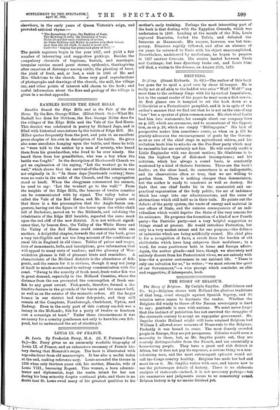RAMBLES ROUND THE EDGE HILLS.
Rambles Round the Edge Hills and in the Vale of the Red Horse. By the Rev. George Miller. (Elliot Stock. 6s.) —What Mr. Bashall has done for Ockham, the Rev. George Miller does for the villages of the Edge Hills and the Vale of the Red Horse. This district was celebrated in poetry by Richard Jago, and is filled with historical associations by the battle of Edge Hill. Mr. Miller quotes frequently from the poet, and puts in an excellent prose chapter of his own in description of the battle. He gives also some anecdotes hanging upon the battle, and these he tells us "were told to the author by a man of seventy, who heard them from his grandmother, who lived to be over ninety. She heard them from her grandfather, who was a boy when the battle was fought." In the description of Shotteswell Church we get an explanation of the saying, "Let the weakest go to the wall," which shows that the survival.of-the-fittest intention was not originally in it: "In those days [fourteenth century] there were no seats in the midst of the Church, and the congregation stood or knelt. When the clergyman commenced his sermon, he used to say : 'Let the weakest go to the wall.'" From the heights of the Edge Hills, the beacons of twelve counties can be communicated with by signal. The valley below is called the Vale of the Red Horse, and Mr. Miller points out that there is a fair presumption that the Anglo-Saxon con. querors, having cut the figure of the horse upon the white chalk hill of Berkshire, moved on to the Midlands, and subduing the inhabitants of the Edge Hill hamlets, repeated the same mark upon the red cliff of the new district. It is not without signifi- cance that, by beacon fires, the Valley of the White Horse and the Valley of the Red Horse could communicate with one another. A delightful chapter, towards the end of the book, gives a very intelligible and not too long account of the conditions of rural life in England in old times. Tables of prices and wages, lists of monuments, bells, and inscriptions, give information that will appeal to many sorts of readers ; and the glossary of War- wickshire phrases is full of pleasant hints and reminders. A characteristic of the Midland districts is the abundance of fish- ponds, and the reason for it is obvious, though it may not jump of itself to minds accustomed to railway communication with the coast. "Owing to the scarcity of fresh meat, fresh-water fish was in great demand, especially in the Midland Counties, where the distance from the sea prevented the consumption of fresh sea- fish to any great extent. Fish-ponds, therefore, formed a dis- tinctive feature in the grounds of the baron and the manor-lord, as well as on the estates of the monastic orders. All the larger houses in our district had their fish-ponds, and they still remain at the Comptons, Farnborough, Chadshunt, Upton, and Radway. Even in the early part of this century sea-fish was a luxury in the Midlands; fish for a party of twelve or fourteen cost a sovereign at least." Under these circumstances it was necessary for a country gentleman not only to have his own fish- pond, but to understand the art of stocking it.






















































 Previous page
Previous page